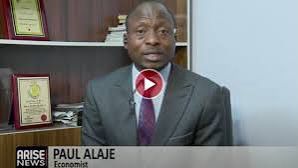/ News
Views: 501
Trump’s Tariff Strategy may spike Nigeria’s Import costs and Inflation, Economist warns

Renowned economist Paul Alaje has raised concerns over potential economic fallout Nigeria could face if former US President Donald Trump reintroduces his aggressive tariff policies. According to him, such a move could spark a surge in import-related inflation, intensify exchange rate instability, and restrict Nigeria’s trade options beyond crude oil.
Speaking on ARISE NEWS on Wednesday, Alaje emphasized that African economies, particularly Nigeria’s, remain vulnerable due to their reliance on imported goods. He explained that although Nigeria’s crude oil exports offer some cushion, the broader economy is not insulated from global shocks stemming from US trade policies.
“In response to some government voices suggesting we’re immune because of our crude sales — well, that only holds partly true,” Alaje stated. “If we focus only on oil, maybe we’re protected. But when we consider the entire economy, we’re already seeing effects, especially with exchange rates. This situation extends to other exports, not just crude and agriculture.”
He further warned about uncertainties surrounding the African Growth and Opportunity Act (AGOA), noting that if Trump’s trade policy includes African nations under the AGOA framework, it would demand an urgent reassessment of Africa’s trade priorities.
“It’s unclear whether AGOA will be exempt from tariffs. If it is, that’s a relief. But if not, Africa must seriously reconsider its trade approach,” he said.
Alaje also highlighted how global supply chains could indirectly channel the impact back to Nigeria — even without direct trade with the United States.
“The effects won’t be limited to our direct transactions with America,” he explained. “Think of it this way: if the US imposes tariffs on goods from Japan, and Nigeria imports from Japan, anything Japan sources from or sells to the US could influence the final price we pay here. The world’s trade network is deeply interconnected.”
He added, “The magnitude of the impact will depend on how strongly these tariffs affect different economies. Given America’s global economic influence, African nations — and Nigeria in particular — must prepare for the ripple effects.”
While Alaje acknowledged that there’s no quick fix to this looming challenge, he stressed the need for Nigeria to act swiftly.
“Can we solve it overnight? No. But there are definitely proactive steps we can take,” he concluded.